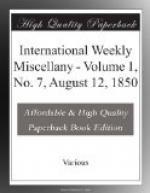command of temper, his almost exhaustless resources
of information, his vigorous and comprehensive intellect
appear to create such astonishment or draw forth such
unbounded admiration as in the early part of 1835.
But, after a well-fought contest he retired once more
into the opposition till the close of the second Melbourne
Administration in 1841. It was in April, 1835,
that Lord Melbourne was restored to power, but the
continued enjoyment of office did not much promote
the political interests of his party, and from various
causes the power of the whigs began to decline.
The commencement of a new reign gave them some popularity,
but in the new House of Commons, elected in consequence
of that event, the conservative party were evidently
gaining strength; still, after the failure of 1834-5,
it was no easy task to dislodge an existing ministry,
and at the same time to be prepared with a cabinet
and a party competent to succeed them. Sir Robert
Peel, therefore, with characteristic caution, “bided
his time”, conducting the business of opposition
throughout the whole of this period with an ability
and success of which history affords few examples.
He had accepted the Reform Bill as the established
law of England, and as the system upon which the country
was thenceforward to be governed. He was willing
to carry it out in its true spirit, but he would proceed
no further. He marshaled his opposition upon
the principle of resistance to any further organic
changes, and he enlisted the majority of the peers
and nearly the whole of the country gentlemen of England
in support of the great principle of protection to
British industry. The little maneuvres and small
political intrigues of the period are almost forgotten,
and the remembrance of them is scarcely worthy of revival.
It may, however, be mentioned, that in 1839 ministers,
being left in a minority, resigned, and Sir Robert
Peel, when sent for by the Queen, demanded that certain
ladies in the household of her majesty,—the
near relatives of eminent whig politicians,—should
be removed from the personal service of the sovereign.
As this was refused, he abandoned for the time any
attempt to form a government, and his opponents remained
in office till September, 1841. It was then Sir
Robert Peel became the first lord of the treasury,
and the Duke of Wellington, without office, accepted
a seat in the cabinet, taking the management of the
House of Lords. His ministry was formed on protectionist
principles, but the close of its career was marked
by the adoption of free trade doctrines differing
in the widest and most liberal sense. Sir Robert
Peel’s sense of public duty impelled him once
more to incur the odium and obliquy which attended
a fundamental change of policy, and a repudiation
of the political partizans by whose ardent support
a minister may have attained office and authority.
It was his fate to encounter more than any man ever
did, that hostility which such conduct, however necessary,




